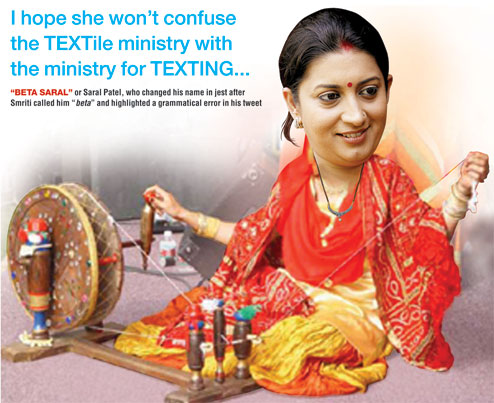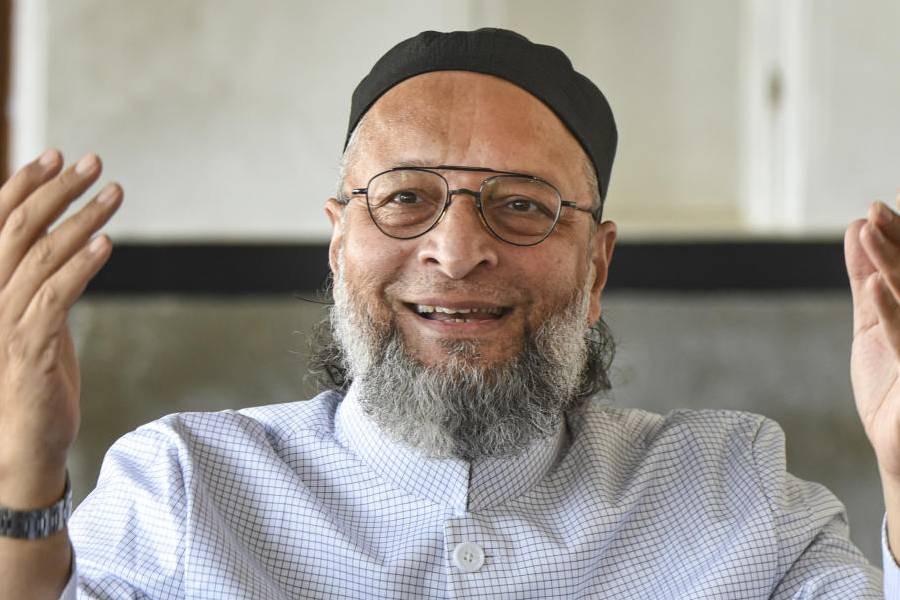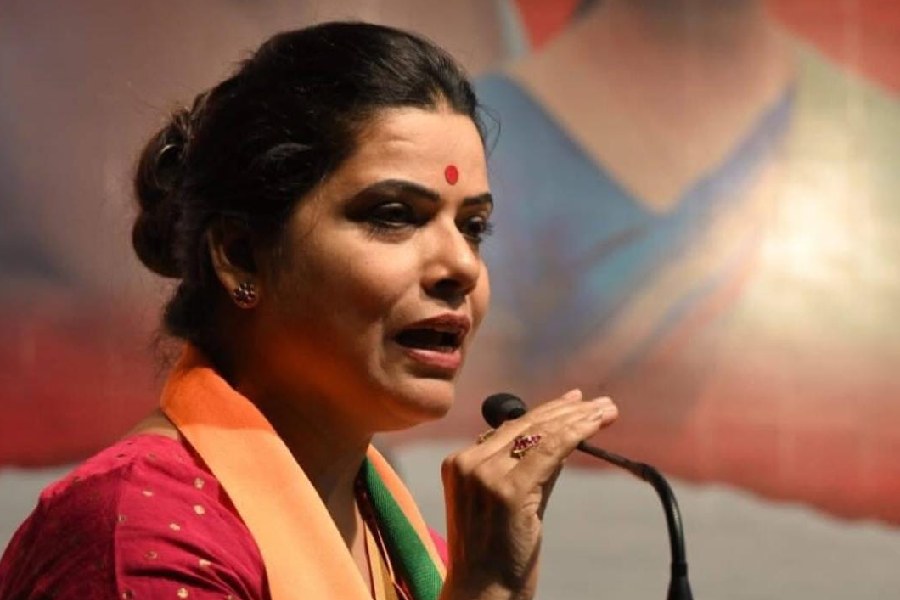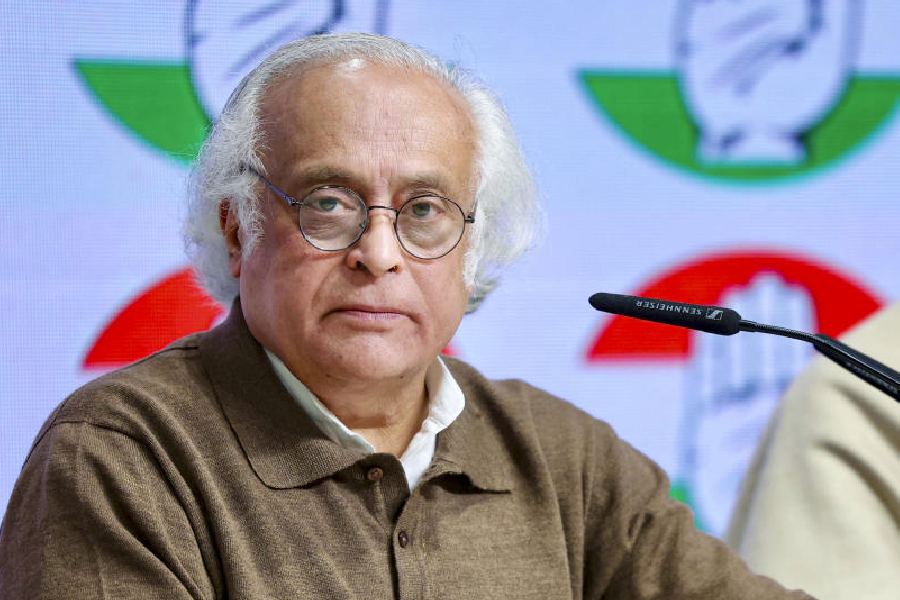
New Delhi, July 5: The sting lay in the tail and came to sting late in the evening.
HRD minister Smriti Irani, overlordly of demeanour and touted as an untouchable favourite of Prime Minister Narendra Modi, lay divested of her prize charge tonight as part of a portfolio shuffle that left many gasping and many gratified.

Smriti was sent packing from HRD to textiles. Information and broadcasting was hived off Arun Jaitley's bagful of responsibilities in a roulette played until late night by Modi and Amit Shah.
It carried a single, hard-hitting message: mid-way through the NDA government's tenure, under-performance will not be countenanced, much less unbridled ambitions, notions of grandeur and delusions of "proximity" to the ruling brass and the RSS. Delivery on target would be rewarded conservatively.
The loud signal emanated on a day Modi inducted 19 junior ministers, promoted a minister of state holding independent charge, Prakash Javadekar, and effected far-reaching changes in the present cabinet where, barring Jaitley to a degree, the other big two, Rajnath Singh and Sushma Swaraj, were left untouched.
Smriti's textiles ministry was earlier held by Santosh Gangwar, the Bareilly MP. Although the textiles industry is one of the biggest employment generators in the country and the government has recently cleared a Rs 6,000-crore package, it does not command the same profile as HRD. Neither does it offer too many avenues to kick up controversies.
Through her over two-year tenure in the HRD ministry, Smriti courted controversies galore, beginning with Modi sympathiser and activist Madhu Kishwar contesting her credentials to oversee education without holding a graduate degree to Smriti's attempts to answer Madhu with half-baked facts, her ham-handed handling of combustible campus disputes and contentious appointments in high places done allegedly under the RSS's pressure.
The flashpoint in Smriti's HRD stint came when Delhi's Jawaharlal Nehru University erupted into prolonged agitation, triggered by the use of excessive force and the arrest of agitating student leaders.
Smriti's effort to defend her case in Parliament was hooted out by the Opposition.
Although the BJP had backed her then - with Modi endorsing her speech with a "Satyamev Jayate" - aspects of Smriti's buccaneer politics started to disconcert party leaders.
She reportedly invoked her "equations" with the RSS and particularly a senior functionary with a special interest in education to prove she was "indispensable" in HRD.
BJP sources said that instead of stemming, she encouraged the perception that she had Modi's "blessings" in whatever steps she took. It is also believed that following the stiff fight she had put up against Rahul Gandhi from Amethi in the 2014 Lok Sabha polls, she allegedly nursed ambitions of wanting to lead the BJP in the Uttar Pradesh Assembly polls.
Bolstered by the applause she got for her speech on the JNU ferment when it was played in a public meeting at Vrindavan in 2015, Smriti apparently began looking at Uttar Pradesh seriously. She made it a point to visit Amethi twice as many times as Rahul does.
Some spin-doctors suggested tonight that Smriti had been "freed up" for Uttar Pradesh. But a BJP source said: "As long as she was confined to nursing it as a Lok Sabha constituency, it was tolerated. The moment she began fancying herself as an Uttar Pradesh ' neta', the leadership's antenna was raised."
BJP president Shah, who partnered Modi closely in the prelude to the cabinet expansion and shuffle, is also micro-managing poll-bound Uttar Pradesh. Shah reportedly did not take kindly to Smriti's alleged over-reach.
Indeed, the portfolio changes took longer than expected because Modi and Shah had reportedly pored over the list for several hours this evening before sending it to President Pranab Mukherjee.
In any case, just as Smriti was built up in 2014 to counter the BJP's poster lady, Sushma - who then had major issues with Modi and Shah - true to his style, Modi stepped in to clip Smriti's wings when he thought it imperative by potentially promoting Anupriya Patel as a foil to her.
Anupriya, who came from the Apna Dal, is the Mirzapur MP and the daughter of a close associate of the Bahujan Samaj Party founder, Kanshi Ram. She belongs to a powerful backward caste. Her education in Delhi's Lady Shri Ram College, followed by a Master's in Business Administration, was highlighted in an unsourced government note on the new ministerial inductions.
Anupriya will be a junior health and family welfare minister but last night's note was construed by some in the BJP as a possible "put-down" of Smriti.
Javadekar's entry, sources hoped, would deflect the "pent-up heat" against the ministry and "restore" a "semblance of balance", although when push comes to shove, he is as good a Sangh " swayamsevak" (volunteer) as several others.
Modi's hard-boiled assessment of the ministries was capped last week with a long-drawn PowerPoint presentation by a top bureaucrat, who analysed threadbare how each department had fared against the budgetary and sundry allocations since 2014.
It resulted in finance minister Jaitley losing I&B to M. Venkaiah Naidu, D.V. Sadananda Gowda law to Ravi Shankar Prasad and Chaudhary Birender Singh being told to hand over rural development, panchayati raj and drinking water and sanitation to Narendra Singh Tomar.
Jaitley, who had defence taken away from him when the first shuffle was effected in November 2014 but was recompensed with I&B, got nothing in return for I&B's loss this time. "The idea is to enable him to focus single-mindedly on finance and properly to restore the economy's robustness," a source said.
Naidu got I&B but yielded parliamentary affairs to Karnataka minister Ananth Kumar. "Managing Parliament was getting to Naidu. He wanted to shake it off and Ananth badly wanted this ministry," a source said.
Although not exactly a Modi favourite, Ananth was "indulged", keeping the "delicate power equations" in Karnataka in mind and his predilection for being a thorn in state BJP president B.S. Yeddyurappa's flesh.
In a peculiar order structured by Modi, a junior minister's potential was recognised and rewarded by assigning him independent charge of a ministry and subordinating him to another ministry under a cabinet minister.
New inductee Vijay Goel, resurrected from Delhi BJP's limbo, was given independent charge of youth affairs and sports and attached to Uma Bharati in water resources, river development and Ganga rejuvenation.
Goel, a Vajpayee and Pramod Mahajan loyalist, worked hard to get on the right side of Modi and Shah by putting up life-sized posters of the duo outside his residence, strategically located opposite the BJP headquarters.
The leadership hopes that as Uma's deputy, Goel would bring the "much-needed" traction to the Ganga rejuvenation project.
While Uttar Pradesh was handed a mixed deal - two ministers from the state, Mahesh Sharma and V.K. Singh, were downsized - contrary to the BJP's expectations, Bihar's representation went untouched.
Barring Goel and Anil Madhav Dave, who were assigned independent ministries, all the other new inductees were made junior ministers, reporting to cabinet ministers.










